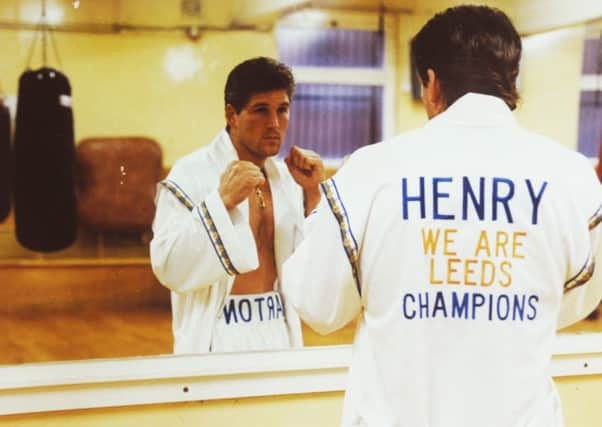Sporting Bygones: When Yorkshire boxer Wharton was paid to stand aside


He is a proud gym owner in York, but two decades ago he fought in honour of Leeds, winning British, Commonwealth and European titles, and 27 of his 31 fights.
He fought two of the biggest names in the history of British middleweight boxing – Nigel Benn and Chris Eubank.
Advertisement
Hide AdAdvertisement
Hide AdAfter turning professional in 1989, Wharton racked up 10 wins before facing Rod Carr for the vacant Commonwealth title in 1991 – a match which he duly won on points. More success came the following year when he picked up the British title with a points win over Fidel Castro Smith.
Often fighting in his home city of Leeds or at the Barbican Centre in nearby York, Wharton was able to build a popular following in the local area.
However, it was not until 1994 that he became known to a much wider audience when he challenged Benn for the WBC super middleweight title.
According to Wharton, it was no easy task getting Benn to face him.
Advertisement
Hide AdAdvertisement
Hide Ad“What people don’t know is that he avoided me for 12 months; he paid me ‘stand-aside’ money – $50,000,” reveals Wharton. “He didn’t fancy the fight because I was a bit of a danger; the No 1 in the world at the time.”
Whatever Benn’s reasons may have been, the fight was finally agreed upon and Wharton went into it full of confidence after a good training camp in America.
Benn’s reputation as a heavy puncher was well known, and although he may not have been quite so devastating once he moved up from middleweight, Wharton still took his power very seriously. “I had to play it cautiously, my plan was always to come on late, come on strong towards the end, but I had just given him too much,” recalls Wharton.
With the fight going the distance and Benn retaining his title with a points win, Wharton now believes it was the wrong strategy.
Advertisement
Hide AdAdvertisement
Hide Ad“I know I could have done more, and it will always live with me that I could have ‘went’ earlier,” he says. Ten months later, Wharton earned another title shot against WBO champion Eubank. Although, not as dangerous a puncher as Benn, Eubank presented Wharton with a whole new set of problems. “Eubank was a counter-puncher and I played into his hands, he was really difficult for me,” he recalled.
“After that fight, I won the European title and reclaimed my position as world No 1, but I was never the same.”
Eubank speaks very highly of Wharton, while his trainer Ronnie Davies believes that Eubank’s performance that night was among the top three of his career.
And Wharton’s is a career that should be remembered fondly, finishing as it did in 1998 with wins in Atlantic City and at his more traditional stomping ground of the Barbican Centre.